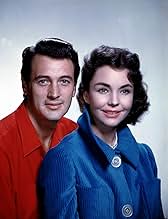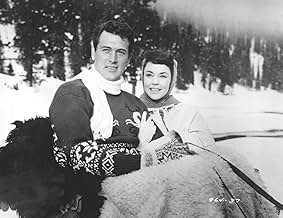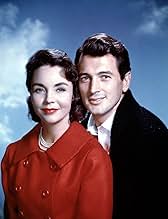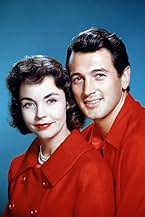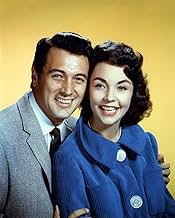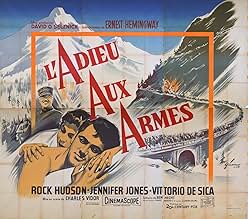IMDb-BEWERTUNG
5,8/10
3049
IHRE BEWERTUNG
Füge eine Handlung in deiner Sprache hinzuAn English nurse and an American ambulance driver on the Italian front during World War 1 fall in love, but the horrors surrounding them challenge their romance to the limit.An English nurse and an American ambulance driver on the Italian front during World War 1 fall in love, but the horrors surrounding them challenge their romance to the limit.An English nurse and an American ambulance driver on the Italian front during World War 1 fall in love, but the horrors surrounding them challenge their romance to the limit.
- Regie
- Drehbuch
- Hauptbesetzung
- Für 1 Oscar nominiert
- 1 Gewinn & 2 Nominierungen insgesamt
José Nieto
- Major Stampi
- (as Jose Nieto)
Georges Bréhat
- Captain Bassi
- (as Georges Brehat)
Luigi Barzini
- Court Martial Colonel
- (Nicht genannt)
Memmo Carotenuto
- Nino the Doorkeeper
- (Nicht genannt)
Empfohlene Bewertungen
Rock Hudson wasn't bad but it was painfully obvious that Jennifer Jones was a lot older than him. It was absurd she was supposed to be English when she sounded just as American as Hudson and Elaine Stritch. The film is spectacular but too overblown for a trifling romantic story.
Strange that one of America's favorite writers has no success in having his novels transferred to the screen with any fidelity or improvement over the original. 'A Farewell to Arms' is a lumbering, turgid, over-stuffed movie that never seems real. Chemistry between Hudson and Jones is simply not there--Jennifer Jones, in particular, seems remote and detached as the nurse even when she's supposed to be wildly in love. And then there's the matter of length--it seems to go on forever with a very weak resolution.
David O. Selznick wanted to create something that would rank alongside his 'Gone with the Wind' as an epic romance with a war background--but the talky script defeated everyone. Hemingway himself publicly disowned the movie, claiming that Jones was far too old for the part and unhappy about the film in general. At any rate, it was not the hoped for success and did nothing to halt the decline of Selznick's career--or Jennifer Jones' career for that matter. A big disappointment.
David O. Selznick wanted to create something that would rank alongside his 'Gone with the Wind' as an epic romance with a war background--but the talky script defeated everyone. Hemingway himself publicly disowned the movie, claiming that Jones was far too old for the part and unhappy about the film in general. At any rate, it was not the hoped for success and did nothing to halt the decline of Selznick's career--or Jennifer Jones' career for that matter. A big disappointment.
Of the top 6 reviews I currently see here, 3 are slamming Jennifer Jones for being too old, 1 is slamming producer David Selznick for being in the decline of his career, 1 is whining that it's not like the book, and 1 is slamming writer Hemingway for not doing any fighting in the war (Um... he was an ambulance driver).
While this film may not deserve an Academy award for best picture, it certainly deserves a decent review on IMDb dedicated to the film itself. So here goes my attempt.
"A Farewell to Arms" is a lavish production of a love story set against the backdrop of World War I. In that respect it's in the same genre as other classic war romances "Gone with the Wind", "Casablanca" and "Platoon ". Haha just checking to see if you're paying attention. Everyone knows "Casablanca" was not set in a war but an occupation.
Where "Farewell" differs from these other classics is in the distribution of war & romance. "Farewell" features far more battle scenes (4) compared to "Gone with the Wind" (zero) and "Casablanca" (zero). The result may be a bit disappointing in the romance department, and several reviewers (as well as the New York Times review on the film's release) have complained about the "lack of chemistry" between the two leads. I think this perception is simply due to the fact that less time is spent setting up the romance, putting more of a burden on the viewer to accept a relationship that simply happens. Viewers may also feel romantically cheated because this is not a traditional romance between two traditional individuals who dream of immediately getting married and having kids and a dog. But in fact this purposely informal, slightly dysfunctional romance is what ultimately made it interesting to me because it marked a change of formula in the age-old Hollywood romance.
If you see this movie, pay close attention to Jennifer Jones' excellent portrayal of a reluctant lover who is perhaps suffering from too many demons to actually fall in love completely, the way she wants to. She is riddled with insecurities, conflicts and possibly guilt, making her like the the stereotypical guy who can't commit. Meanwhile Rock Hudson plays a character more like the stereotypical lovesick schoolgirl. If you enjoy stereotype reversals like this, you'll definitely find yourself interested in their "lack of chemistry".
Was Jennifer Jones too old (late 30s) to play the role of Katherine as Hemingway had intended her (early 20s)? Probably. Did Jennifer get the part because she was married to producer Selznick? Absolutely. Does any of this make her a bad actress? No way. Short of Vivien Leigh, I think she was the best person to play the role as she did: the troubled lover whose cynical, morbid thoughts were always brewing not far away, despite her outwardly cheerful appearance. Actually I take back the thing about Vivien Leigh being better; the more I think about it, Jennifer was ideal for this sort of character.
A subplot involving Vittorio de Sica's war-weary character descending into madness is sure to catch your attention. It was actually my favorite part of the movie, and I wish they had spent more time on this complex character shift as well as his interesting polite antagonism of the church (with a spectacular short speech he says to the priest near the end). But alas, with the romance and the battle scenes already vying for screen time, Vittorio's story only got 2 or 3 dedicated scenes. They were powerful nonetheless.
Yes, as others mentioned, the ending seemed abrupt. But after thinking about it, I think it was perfectly in line with some of the interesting & unusual themes that the story set up. In short, this is not a straightforward soldier-meets-girl love story. The conflicts that are presented (particularly in Jennifer Jones' mysteriously troubled psyche) make this romance much more than meets the eye. If you enjoy wartime romances that are not always formulaic love stories (i.e. they may contain hidden dysfunctional surprises), check this one out.
While this film may not deserve an Academy award for best picture, it certainly deserves a decent review on IMDb dedicated to the film itself. So here goes my attempt.
"A Farewell to Arms" is a lavish production of a love story set against the backdrop of World War I. In that respect it's in the same genre as other classic war romances "Gone with the Wind", "Casablanca" and "Platoon ". Haha just checking to see if you're paying attention. Everyone knows "Casablanca" was not set in a war but an occupation.
Where "Farewell" differs from these other classics is in the distribution of war & romance. "Farewell" features far more battle scenes (4) compared to "Gone with the Wind" (zero) and "Casablanca" (zero). The result may be a bit disappointing in the romance department, and several reviewers (as well as the New York Times review on the film's release) have complained about the "lack of chemistry" between the two leads. I think this perception is simply due to the fact that less time is spent setting up the romance, putting more of a burden on the viewer to accept a relationship that simply happens. Viewers may also feel romantically cheated because this is not a traditional romance between two traditional individuals who dream of immediately getting married and having kids and a dog. But in fact this purposely informal, slightly dysfunctional romance is what ultimately made it interesting to me because it marked a change of formula in the age-old Hollywood romance.
If you see this movie, pay close attention to Jennifer Jones' excellent portrayal of a reluctant lover who is perhaps suffering from too many demons to actually fall in love completely, the way she wants to. She is riddled with insecurities, conflicts and possibly guilt, making her like the the stereotypical guy who can't commit. Meanwhile Rock Hudson plays a character more like the stereotypical lovesick schoolgirl. If you enjoy stereotype reversals like this, you'll definitely find yourself interested in their "lack of chemistry".
Was Jennifer Jones too old (late 30s) to play the role of Katherine as Hemingway had intended her (early 20s)? Probably. Did Jennifer get the part because she was married to producer Selznick? Absolutely. Does any of this make her a bad actress? No way. Short of Vivien Leigh, I think she was the best person to play the role as she did: the troubled lover whose cynical, morbid thoughts were always brewing not far away, despite her outwardly cheerful appearance. Actually I take back the thing about Vivien Leigh being better; the more I think about it, Jennifer was ideal for this sort of character.
A subplot involving Vittorio de Sica's war-weary character descending into madness is sure to catch your attention. It was actually my favorite part of the movie, and I wish they had spent more time on this complex character shift as well as his interesting polite antagonism of the church (with a spectacular short speech he says to the priest near the end). But alas, with the romance and the battle scenes already vying for screen time, Vittorio's story only got 2 or 3 dedicated scenes. They were powerful nonetheless.
Yes, as others mentioned, the ending seemed abrupt. But after thinking about it, I think it was perfectly in line with some of the interesting & unusual themes that the story set up. In short, this is not a straightforward soldier-meets-girl love story. The conflicts that are presented (particularly in Jennifer Jones' mysteriously troubled psyche) make this romance much more than meets the eye. If you enjoy wartime romances that are not always formulaic love stories (i.e. they may contain hidden dysfunctional surprises), check this one out.
Recently read the book...disappointed by the movie as it departed from the story in several key areas. The scenery was pretty.
I really wanted to like A Farewell to Arms. But despite for love for Ernest Hemingway and for Rock Hudson, A Farewell to Arms just didn't work for me. Granted it does look amazing, with ravishing use of CinemaScope and the scenery and costumes are gorgeous as you can see in the first hour. The direction is fine, and the music is beautiful and cleverly composed. However, in the pace the film was very pedestrian, but the pace wasn't the only dull thing about it. I am especially talking about the story, which was overall uninteresting and wasn't affecting, and the script, which is really stilted in a lot of scenes. The ending also felt abrupt. The acting is not good, considering how talented the actors are. I love Rock Hudson, and he visibly tries hard and looks really handsome here but he seems very out of his depth. Jennifer Jones is miscast, and her performance is a very uneven mix of overacting and underacting, also she seems very detached from her character and Hudson as well. As for Vittoria di Sica, he overdoes it so wildly you feel as though he accidentally walked onto the wrong set. All in all, despite the talented cast and director and the beautiful visuals and score, the film was dull. 3/10 Bethany Cox
Wusstest du schon
- WissenswertesRock Hudson turned down The Bridge on the River Kwai (1957), Sayonara (1957) and Ben Hur (1959) in order to make this film. He later said this was the biggest mistake of his career.
- PatzerThe British nurses at the hospital all have American accents.
- Zitate
Major Alessandro Rinaldi: She's very strange, very moody, who knows she might even prefer you to me.
- Crazy CreditsProducer David O. Selznick tries to imitate the opening credits of his classic film, "Gone With The Wind", by having the letters of the title "A Farewell to Arms" sweep slowly across the screen from right to left.
- VerbindungenFeatured in Time Tunnel: The Ghost of Nero (1967)
Top-Auswahl
Melde dich zum Bewerten an und greife auf die Watchlist für personalisierte Empfehlungen zu.
- How long is A Farewell to Arms?Powered by Alexa
Details
- Erscheinungsdatum
- Herkunftsland
- Sprachen
- Auch bekannt als
- Adiós a las armas
- Drehorte
- Venzone, Udine, Friuli-Venezia Giulia, Italien(first 20 minutes)
- Produktionsfirma
- Weitere beteiligte Unternehmen bei IMDbPro anzeigen
Box Office
- Budget
- 4.353.000 $ (geschätzt)
- Laufzeit2 Stunden 32 Minuten
- Farbe
- Seitenverhältnis
- 2.35 : 1
Zu dieser Seite beitragen
Bearbeitung vorschlagen oder fehlenden Inhalt hinzufügen

Oberste Lücke
By what name was In einem anderen Land (1957) officially released in India in English?
Antwort

